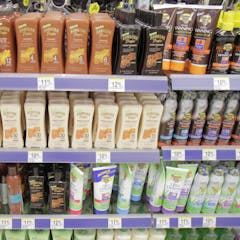
Articles on Ultraviolet radiation
Displaying all articles

Not all sunscreens work the same way and some might irritate people with sensitive skin.

Widespread screening for skin cancer may not be necessary, but it is important to understand the risks behind UV overexposure and to get checked early if you have concerns.

Chlorofluorocarbons (CFCs) are also potent greenhouse gases which contribute to climate change.

Ultraviolet radiation at specific wavelengths is great at killing germs – but when used incorrectly, it can also cause health risks.

Rising concern about possible environmental damage from the active ingredients in sunscreens could have ripple effects on public health if it causes people to use less of them.

What you need to know about blue light protection lotions.

UV lights come in a variety of different wavelengths, but not all are equally effective at disinfection. Researchers tested a number of commercially available lights to find the best.

New research shows how the Montreal Protocol protected vegetation, helping keep carbon out of the atmosphere.

Astronomers just measured the largest flare ever from Proxima Centauri, humanity’s closest neighboring star. These flares could be bad news for life trying to develop on a planet orbiting the star.

The seasons can affect transmission of the virus – but this will likely be dwarfed by the impact of public health measures.

Researchers are developing tattoo inks that do more than make pretty colors. Some can sense chemicals, temperature and UV radiation, setting the stage for tattoos that diagnose health problems.

Too much ultraviolet radiation is dangerous for human health. Excessive exposure can cause skin ageing and sunburn and can induce melanoma, cataracts, ocular melanoma, and immunodeficiency.

The sun emits harmful rays 365 days a year, even when cloudy or rainy. Children must be protected or they may develop cataracts at an earlier age and run the risk of skin cancer of the eyelids.

If you want to live on Mars, you’re going to need to grow food. Seeds are naturally equipped to handle challenging Earth environments, but how well can they survive what they’ll encounter off-planet?

It’s like one great big distillery up there.

Energy from the sun’s rays can cause skin damage and cancers. Sunscreens can absorb or reflect the dangerous UV light. Here’s how it works.

Nearly 40,000 cancers diagnosed in Australia can be prevented if people avoid known risk factors for the disease, according to research published today.

Runners have a greater risk of developing skin cancer because they are more likely have sun damage on their skin as a result of chronic sun exposure.

A real-time hand-held device can help employers measure the impact of the sun on workers.

